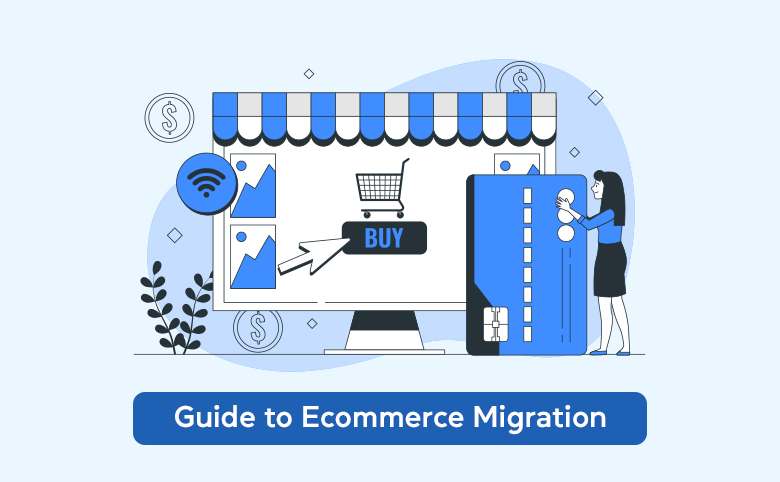Guide to Ecommerce Migration – What you need to know about Changing to a New Ecommerce Platform
Migrating to a new ecommerce platform is not a walk in the park. Unless you are super-attentive to details, you risk losing SEO rankings, organic traffic and sales. Worry not, because with assistance from eMarket Experts, you will be able to migrate your store ???? to a new platform like a pro.
But a platform migration is a big project. So before you commit to it, you need to understand why you’re doing it and what the potential risks and benefits are.
Why Migrate to a New Ecommerce Platform?
If you are considering migration to a new ecommerce platform, you better have some very good reasons. Here are the most common issues that drive online retailers to replatform:
- Compromised Site Performance
- High Maintenance Costs
- Poor Customer Experience
- Missing Features and Capabilities
You risk losing 37% of your web visitors if your site takes more than 5 seconds to load. Performance issues such as slow site speed, lack of integration with latest tools, and difficulty in developing new features can make replatforming your only choice.
Website maintenance costs may include the cost of site repairs, optimisation, and software or plugin updates. On an outdated or poorly managed site, these issues can inflate the total cost of ownership and end up wasting a lot of time and resources. While moving to a new platform may be costly, it could end up saving you money in the long run.
As many as 86% of customers would quit using a brand after having as few as two poor experiences. If your existing store looks like a blast from the past, does’t offer the latest technology and delivers a poor customer experience, your conversion rates can take a serious hit.
Old and outdated platforms are not optimised for the latest mobile devices, social media and messaging apps. This is a serious limitation in the age of mobile-first indexing and warrants a migration.
Challenges of Ecommerce Migration
Ecommerce migration is fraught with challenges that you should be aware of and prepared to handle.
Data Migration
One of the biggest challenges facing any replatforming project is data migration. This can be a challenging and time consuming task; however, all data has to be migrated smoothly without any losses.
Vital data to be transferred includes:
- Products and Categories: details, descriptions, SKU, price, stock status and quantity, meta titles and descriptions, variants, images
- Customer Data: name, email, shipping and billing addresses, purchase history
- Order Data: sales history, dates, prices, shipping info, addresses, emails
- Customer reviews
- Content and blog data
It’s worth noting that due to the work involved in ensuring that all data is fully migrated, some agencies may recommend simply deleting some of your precious data to speed up the process.
We DO NOT recommend this. It is vital that all data is properly transferred to the new platform, and a good digital marketing agency will know how to do this efficiently and effectively.
Shipping and Payment Integration
Another challenge that is too often overlooked is ensuring that your shipping and payment providers ???? can be integrated into your new ecommerce platform. Shipping providers and payment gateways will generally need to be integrated into the platform via an API. This enables customers to calculate shipping costs and make payments without having to leave your site.
It’s worth noting that not all shipping and payment providers can be easily integrated into all ecommerce platforms. From the outset, you should ensure that your preferred payment gateways and shipping providers can be easily integrated into your new platform.
SEO and Referral Traffic
Your SEO rankings and organic traffic may drop, at least temporarily. You may also lose referral traffic from blogs, forums, and social media. It is important that you plan your ecommerce store migration for a slow sales period, so you have the time to identify and fix the factors affecting your organic and referral traffic.
301 Redirects & 404 Errors
Search engines cache the landing page URLs of your old website. You should try to retain the old URLs on the new platform where possible. If the URLs have to be changed, 301 redirects need to be set up. 301s tell google that your page has moved to a new URL permanently. Track and fix 404 errors for the pages that might have been lost in the migration.
Integration Issues
Your ecommerce stores may be connected to several third-party applications such as CRMs, email apps, supply chain management software, and your accounting system. All of these apps need to be synced and checked during migration.
CX and Brand Image
Your customers may get confused and stop visiting you if the new store design causes inconsistencies in their shopping experience. ???? Abrupt, drastic changes can affect the customer experience and erode trust in your brand, so it is essential to go for a gradual transition.
Selecting the Best Ecommerce Platform
The choice of the best ecommerce platform will be dictated by your business needs and migration goals. Broadly speaking, you have two options: self-hosted and cloud-hosted platforms.
Self-Hosted Ecommerce Platforms
Examples of self-hosted ecommerce platforms include WooCommerce, Joomla, and Magento Commerce Pro. The platform software is licensed from the provider and then hosted on the company’s internal network or with a third-party hosting provider such as GoDaddy or SiteGround.
Self-hosted or on-premise platforms are ideal for your business if you want total control over your site. You can customise as you want and boost site speed and performance with the help of a developer or digital marketing agency. However, you are also solely responsible for the security and maintenance of the site.
Cloud Hosted SaaS Ecommerce Platforms
Examples of SaaS (Software as a Service) ecommerce platforms include Shopify, BigCommerce, Wix, and Salesforce Commerce Cloud. SaaS solutions allow you to rent the software as well as the hosting and platform management. The SaaS provider is responsible for updating the software, securing the website, and ensuring PCI compliance.
Open SaaS platforms such as BigCommerce come with built-in integration with popular third-party apps and are much easier to deploy compared to self-hosted platforms.
A High-Level Migration Checklist

There are plenty of technical components that shouldn’t be forgotten during a replatforming project. These can be carried out by your in-house developers or outsourced to a quality digital marketing agency.
Crawl your current website using ScreamingFrog , DeepCrawl or another crawler of your choice. Analyse Google Search Console data to discover the following:
- Structured data and hreflang tags that needs to be migrated to the new platform
- Any 404s that needs to fixed before the migration
- Meta robots nofollow tags, GAID and type of code being used, and pages with no index tags
- Review canonical tags, title tags, meta description tags, and H1 and H2 tags
- List down all known live URLs in a worksheet
- Work out a 301 redirect strategy based on your analysis and document how it will be implemented
- Do a technical SEO audit by reviewing the sitemap and wireframes, 404 errors, and browsing the staging site with multiple devices
- Check the staging site for duplicate content, mobile usability, and JavaScript functionality
- Launch the site and verify that the 301s are working and there are no technical issues
- Verify that the robots.text file is not blocking the new site
- Confirm that nofollow tags have been added to pages that you don’t want index
- Check internal links and canonical tags, title tags, duplicate URLs, meta descriptions, and word count by comparing with your old website
- Test site speed and review Google Analytics and Search Console to find out if any errors exist
- Monitor the site for a couple of months and identify and resolve the issues that might be driving down traffic and search rankings
Ready to Migrate?
There’s a lot more to ecommerce migration than meets the eye. Each step in the above checklist contains several intricate details that may be overwhelming to address on your own.
If you’re planning a replatforming project, it’s worth working with a professional team of developers or a digital marketing agency if you want to achieve the goals of the migration. We have helped many ecommerce retailers migrate their sites to new platforms, domains, and URLs with excellent results. Feel free to get in touch!








